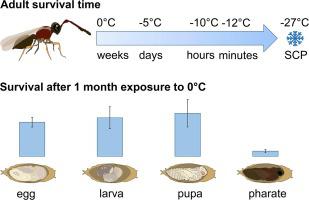Journal of Insect Physiology ( IF 2.3 ) Pub Date : 2020-07-04 , DOI: 10.1016/j.jinsphys.2020.104087 Nasim Amiresmaeili 1 , Jörg Romeis 1 , Jana Collatz 2

|
Trichopria drosophilae (Perkins) (Hymenoptera: Diapriidae) is a pupal parasitoid of drosophila flies recorded from several parts of the world. It is currently considered for augmentative biological programs to control the severe agricultural pest Drosophila suzukii (Matsumura) (Diptera: Drosophilidae). Since D. suzukii has invaded regions that experience zero and sub-zero winter temperatures, cold tolerance of the parasitoid is an important aspect to consider. We characterized low temperature tolerance and overwintering capacity of a colony of T. drosophilae collected in Northern Switzerland. We used copper-constantan thermocouples to determine the supercooling point and pre-freeze mortality. Moreover, we subjected honey-fed and unfed adult T. drosophilae as well as developing stages within their drosophila host to short- and long-term acclimation conditions and assessed the duration of their survival at low temperatures. Finally, we exposed adult and sub-adult stages to winter conditions in a semi-field experiment and evaluated their survival. We found that T. drosophilae is chill susceptible like D. suzukii, but adults froze and survived at colder temperatures than those reported for D. suzukii. Adult parasitoids could tolerate several days of exposure to sub-zero temperatures and could reproduce afterwards, whereas sub-adult stages could survive longer periods under these conditions. The provision of honey and water enhanced the survival of adults and long-term acclimation led to longer survival in all stages. The semi-field experiment supported the results of the laboratory tests. Based on these results we suggest that in Central Europe, T. drosophilae survives winters mainly in developing stages but adults are likely able to tolerate short periods of low spring temperatures.
中文翻译:

果蝇p寄生性果蝇果蝇的耐寒性。
果蝇Trichopria drosophilae(Perkins)(膜翅目:双翅目)是一种在世界各地记录的果蝇果蝇的para寄生虫。目前考虑将其用于增强生物程序以控制严重的农业害虫铃木果蝇(松村)(双翅目:果蝇科)。由于铃木D.入侵了经历零和零零以下冬季温度的地区,因此,寄生虫的耐寒性是需要考虑的重要方面。我们表征了在瑞士北部收集的嗜果蝇的菌落的低温耐受性和越冬能力。我们使用铜-常数热电偶来确定过冷点和预冻死亡率。此外,我们接受了蜂蜜喂养和未喂养的成年人果蝇T.果蝇及其果蝇的发育阶段接受短期和长期的适应条件,并评估其在低温下的存活时间。最后,我们在半田野实验中将成年阶段和亚成年阶段暴露于冬季条件下,并评估了它们的存活率。我们发现果蝇T. suzukii像D. suzukii一样容易感冒,但是成年后,他们冻结并在比D. suzukii更低的温度下生存。。成年的寄生虫可以忍受几天暴露于零下温度,然后可以繁殖,而在此条件下,亚成虫阶段可以存活更长的时间。蜂蜜和水的提供提高了成年者的生存率,长期适应导致各个阶段的生存期更长。半场实验支持实验室测试的结果。根据这些结果,我们建议在中欧,果蝇在冬季主要在发育阶段幸存下来,但成年人很可能能够忍受短暂的春季低温。











































 京公网安备 11010802027423号
京公网安备 11010802027423号